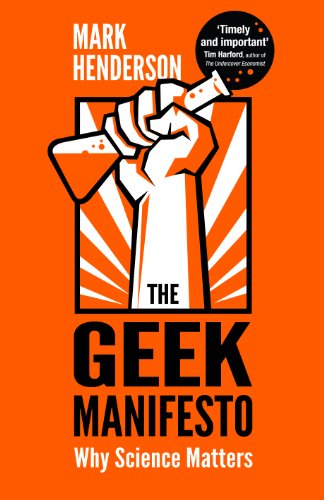 There is something of an irony in the fact that on the very day the Queen announced that libel reform is now on the legislative agenda, Mark Henderson has lost his voice.
There is something of an irony in the fact that on the very day the Queen announced that libel reform is now on the legislative agenda, Mark Henderson has lost his voice.
We meet in the glassy atrium of the Wellcome Trust, the world's largest biomedical research funder, where Henderson has recently taken up the post of head of communications after building a career in science reporting at the Times. His new book, The Geek Manifesto, focuses in particular on the way that the battle for reform of the archaic and open-to-abuse libel laws has galvanised a new movement of geeks. The geek voice, in the form of campaigning journalists and scientists like Simon Singh and Ben Goldacre, is increasingly being heard. Yet on this day of all days Henderson’s is barely above a whisper: "Science can do many things," he croaks, “but it can't yet cure the common cold.”
Yet Henderson comes through loud and clear in his new book, which opens with the story of how rationalists and sceptics backed science writer Simon Singh in his successful fight against a libel claim. It was this case and the campaign around it, Henderson argues, that won libel reform a place in the Queen's speech and a commitment to act from the government.
This represents a big step forward for geeks who, if Henderson’s book is right, are leading the fight for a more rational approach to politics and more evidence-based policy.
The Geek Manifesto details how the geek consensus, not just scientists or lobbyists, but ordinary people who care about facts and evidence, can harness the power of new technology – especially social media – to call out the likes of Nadine Dorries and David Tredinnick on their unscientific urban myths. Henderson uses this head of steam to call for a revolution in how Parliament and government handle science. The time is now, he says, because “over the last ten years there's been a real rise in science and scepticism, and geek issues in popular culture”.
For Henderson, the success of Ben Goldacre's Bad Science blog, prof-turned-presenter Brian Cox and pro-science comedians such as Robin Ince, has “crystallised into a feeling that there was this wonderful groundswell of sceptic science and geek thinking that was becoming something of a movement.”
And yet, he says, the movement had hardly any organised political presence, no concerted effort which could harness the energy of the high-profile tactical campaigns around libel, or the outcry over the sacking of Professor David Nutt for supplying scientific advice on drug use to the government that it didn't want to hear. For Henderson, the time is right to pull together the strands of rationalism and try to form them into a political movement.
But a movement of "geeks"? The standard trope assumes that geeks don't move much at all: they're either hunched over a microscope on a lab bench or slumped on a couch playing video games and grasping for the hardened cheese from last night's pizza box. But that's an archaic use of the term, says Henderson. “’Geek’ is one of those great reclaimed words,” he argues. “You get people who talk about themselves as film geeks, politics geeks, music geeks”: the word has been reclaimed to signify a dedicated curiosity. Henderson's geeks share a willingness to delve, something they have in common with scepticism and, more specifically, professional geekdom: science.
In this framing, geeks constitute a broad-based movement. But this presents a problem for Henderson's planned revolution. Geeks rarely mobilise around a specific issue like, say, the greens. They'll sign reactive online petitions or mock politicians during a meeting down the pub. But are there really signs of Henderson's “geek groundswell” in society at large?
If there are few signs of this it might be because, as Henderson argues in the book, there's no political cost for mishandling evidence. The Geek Manifesto identifies six types of evidence crime – from "imaginary evidence" to "evidence shopping" – committed most frequently by policymakers. Henderson’s description of each is both satirical and alarming, as it exposes just how little understanding politicians and apparently the public have of scientific evidence. Ministers may be obsessed with brandishing evidence in support of their policies – from drug classification to homebirth initiatives. But all too often they produce policy-based evidence rather than evidence-based policy.
Henderson offers some concrete proposals to change this, including the creation of an Office for Scientific Responsibility (OSR), along the same model as the Office for Budget Responsibility, established in the wake of the recent financial crisis. The OSR would audit any evidence claimed by a politician to support a policy and, if it is poor, issue an official rebuke.
“I’m not saying that politicians must always follow the evidence,” Henderson explains. “There are other factors they need to take into consideration. But if they're not following the evidence, they need to say so, to justify why. They don’t do that at the moment; they claim that everything’s evidence-based and it’s not.”
I wouldn’t want to let politicians off the hook for this error. But the fact is that a nuanced understanding of what evidence is, how it is produced and the careful fashion with which it must be compared to ideology is simply not embedded in our society as a whole. In the classroom, lessons about scientific laws are placed above those of the scientific method itself.
Ben Goldacre’s Bad Science column has tackled this issue, by pointing out the mistakes of anyone handling statistics or a scientific study and inspiring others to do the same. But I suspect that few people question, for example, the apparently evidence-based marketing claims of skin cream companies. Far fewer would write to the manufacturer or their MPs about it, in the kind of geek activism Henderson wants to see.
The idea of politicians behaving more like scientists or, at least, rationalists, is a seductive one. But they will only do so when the electorate forces them to. Henderson is aware of this challenge, and The Geek Manifesto is his timely and thoughtful contribution to the cause. It could even inspire geeks to unite and march on parliament. Thanks to Henderson’s clear logic, this seems eminently more possible than science curing the common cold.
The Geek Manifesto is published by Bantam Press

